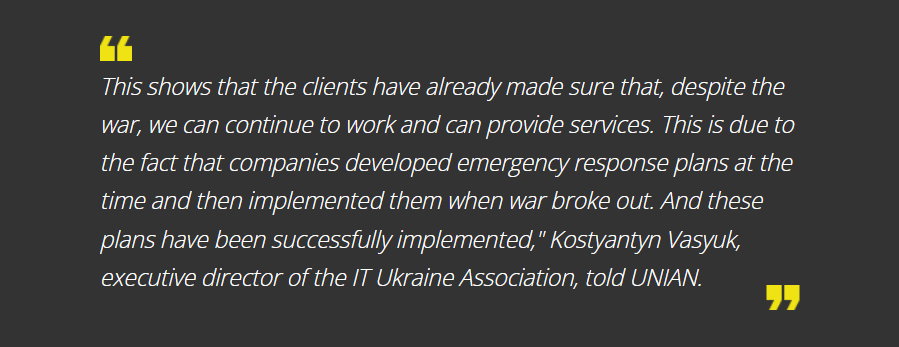Impact of the War in Ukraine on the IT Sector
Is doing Business in Ukraine as Risky as it Seems? How was IT Business Able to Stay in the Game?
15 August, 2022
Impact of the War in Ukraine on the IT Sector

Ukraine is One of the Largest Sources of IT Talent in Europe
In the last two decades, Eastern Europe has become one of the biggest suppliers of IT services in the world. Until recently, Ukraine, Poland, Romania and Belarus accounted for 5% of the world IT outsourcing market.
The region has gained global recognition as the hub of highly skilled professionals who have strong expertise both in popular and rare technologies. Ukrainian developers are aligned with Western cultural values, which makes them a perfect fit for software companies in the US, Great Britain, Germany, and Australia.
With 200 000 developers and the rates ranging from 30 to 60 USD per hour (which is the lowest in Eastern Europe), Ukraine is one of the most popular destinations of IT services.
At least this was the case before the war broke out. With the beginning of the military actions, the situation has undergone some serious changes.

How did Ukrainian IT Companies Meet Military Aggression?
Since a full-on invasion in Ukraine, our country has been suffering numerous traumas and losses in various spheres. Nevertheless, the IT industry, one of the key sectors of our economy, continues to function and supply money to the economy. Given the predicament Ukraine is in, these funds are critical, as they are used for salaries, the purchase of weapons necessary for defenders, social support of the population and the reconstruction of our cities.
In general, Ukrainian IT turned out to be very stress-resistant. Despite the war, IT companies that operate on the international market were able to retain 95% of contracts and some even closed more deals at the beginning of the war. During the first 3 months of 2022, the IT industry supplied the unprecedented 2 billion USD, compared to the same period last year.

How was IT Business Able to Stay in the Game?
The war didn’t start out of the blue. Our country had been involved in the military conflict for about 8 years before it turned into a full-out war. As of February 24, many companies had worked out action plans regarding the preservation of business, the evacuation of specialists and their families, and the continuation of full-fledged economic activity.
The majority of companies kept their staff informed about the risks and offered relocation opportunities to the Western regions of the country as well as Eastern European countries. In such a way, many IT businesses managed to keep going amid the military turmoil and enabled non-stop work on their current projects.
At the same time, a lot of international companies showed their support for Ukraine and decided not to terminate their existing contracts. If the Ukrainian company had worked with the Western market before, had a good reputation and was able to communicate with partners and explain that the war didn’t affect their work efficiency in any way, their international partners remained loyal.
Moreover, the industry had seen the increased number of closed deals in the first weeks of the military invasion as a sign of sympathy and assistance.
Unfortunately, that trend didn’t continue as the war escalated. Despite all the Western support for Ukraine, the business logic is against it. While the war continues in the country, it is difficult enough for international investors to finance our technological projects to the extent that it was before. Business in a country with such an aggressive neighbor seems to be a risk. How can you trust the development of a company whose employees risk moving to the basement every day?
Of course, there are many companies that want to support us – some send funds to help, some leave the aggressor’s market, some open free access to their products. But they are not ready to fully risk and “enter” the country where the war is going on.

Is doing Business in Ukraine as Risky as it Seems?
After a period of war-related slump in orders and contracts, Ukrainian IT market is starting to revive. There is a positive tendency of customers returning or planning to return to cooperation with Ukrainian IT companies.

There are several reasons for companies choosing Ukraine for development services:
- Highly-qualified professionals at reasonable rates. The price/quality ratio for the services of specialists of the required level is the most optimal on our IT market. Salaries in Eastern Europe are 10–30% higher than in Ukraine. If a middle-senior developer here works for a salary of $6,000, in Poland the same specialist will expect $8,000 and above.
- Candidates from Ukraine start working on the project much faster. As a rule, it takes them from 2 to 4 weeks to get to work after signing an offer, whereas in other countries it can take up to 3 months, which causes a lot of time loss for customers.
- Start of cooperation is easy and not complicated on the legal side. There is no need to get involved in complex taxation schemes, worry about a local legal entity and spend time and resources trying to figure it all out. In other European countries, doing business is not that simple.

What are Developers’ Expectations During the War?
Ukrainian IT is quite dependent on the world market. And on the latter, the demand for IT specialists does not decrease, but only increases. 500,000 – 800,000 vacancies that are not closed in the United States of America are distributed around the world, a large part of which still goes to Ukraine.
At the same time, military actions have had a serious impact on the recruitment sphere all over the country, including the IT market. Millions of people had to relocate to safer regions within the country or abroad. The employers operating on the local market remain to be in the state of confusion as for which direction to choose with their business. All these insecurities influenced on the number of job openings, salaries and bonuses offered as well as candidates’ expectations. So, let’s look at what the developers pay attention to when choosing which company to join.
ITExpert has conducted a survey which uncovered the following shift in preferences:
- Financial security and availability of project tasks – 76%.
- No cooperation with companies based in Russia and Belarus – 72%.
- More flexible way of working and workload planning – 47%.
- Transparent communication as for the situation within the company – 39%.
- Open and clear position regarding the war – 35%.
- Help with relocation (including the family) – 31%.
- Job retention in case of mobilization – 29%.
- Additional financial aid – 19%.
- Psychological support of the team – 14%.
What about salary expectations of the candidates? Have they changed? According to the same survey, 53% of respondents expect to receive the same amount of compensation for their work as in the pre-war period. At the same time, 31% of respondents would like to receive a 10-20% higher salary, while 15% are prepared to receive less.

BandaPixels Maintains Efficient Operation During the War
Even though the situation in our country remains to be challenging for people and organisations alike, we have been able to streamline the critical work processes of the company and continue smooth operation.
At BandaPixels, we worked out a business continuity plan in case of war. Therefore, in the first months of the invasion, we focused on coordinated managerial decisions and quick recovery of work. From the first days, we announced the following priorities for the entire team:
- Security right now.
- Long-term security (availability of a place to live, food, warmth, psychological state, etc.)
- Participation in territorial defense and volunteering, etc.
- Work on projects.
At the same time, from the first days after the start of the full-scale war, we emphasized that a full recovery of work is a very important next step. Of course, if all the previous steps are completed. We conveyed this idea to long-term partners, customers and the team.
It was not important for us to work eight hours a day, but the team was looking for ways to switch from the gloom of military news to a constructive workflow.
Despite the fact that the continuous military actions present tremendous financial dangers, neither our existing nor new clients have expressed the intention to stop collaboration with BandaPixels. On the contrary, some of them have even increased the project scopes.
At present, the majority of our team work at the office and are fully committed to their current projects, which are progressing according to the planned timeframes.
Besides, we have recently opened an office in Eastern Europe, so BandaPixels is ready for any scenario.
We are open to cooperation and are ready to deliver quality products with the due speed. Contact us to talk about the project you have in mind and how you can leverage our expertise and experience.
by Vlada Hladyr
Let's work together to make your project a success
Contact usLast News
Thank you!
We’ve received your contact request and will contact you soon
Something went wrong
We couldn’t receive your contact request. Please try again later.